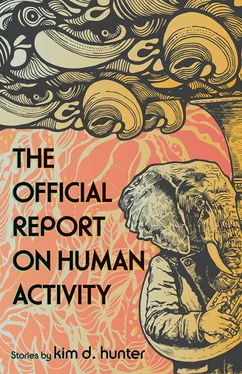Everything smelled like oil or plastic that was overheated, on the verge of catching fire. There was that and body odor from the inoculations.
Nat began in a cell with six others, one of whom was mentally ill and prone to attack others. The guards would swoop in, grind the glass of the emergency doors with a swift opening, and sedate the prisoner. The sedation would last for a day or so before he attacked someone again. Everyone was nursing a bruise or a cut, sustained mostly at night or just before sunrise and work. Some were so tired from lack of sleep they slept through at least part of the attack.
After a few months, seven, perhaps nine, Nat was moved to a cell with only four people including him. Two more people replaced him in the other cell. There was no mentally ill person in the new cell. There was a person with some power. The Prisoner had no bracelet monitor and his “uniform,” though prison issue, was barely distinguishable from regular clothing.
Nat tried to hide the fear and disappointment in his smile as he greeted the Prisoner first and then the others.
“What you scared of?” the Prisoner spoke in a melodious husky voice, probably altered. “Extra work for extra reward. What’s the problem?”
During the day, Nat’s job was to mix and apply chemicals to scrap plastic, turning it back into its organic components and making oil in the process. No one knew what was happening to the oil, only that a small percentage of it was burned for energy in remote places. The process of converting plastic back into oil produced the burning smell that permeated everything and that no one ever got used to. Scientists whose pensions didn’t allow them to retire studied why no one ever got used to it. The research was endless. People had nightmares about the smell and dreams about escaping it.
With the move to the new cell, Nat had an additional and “unofficial” job. Hours before or after the regular shift, the transparent walls of the cell would become gray and opaque. Everyone but the Prisoner would be fixed for temporary blindness and deafness. When they could see and hear again, they would be seated at equipment used to make the drug AT. It had a long, official, technical name no one but scientists used. Everyone else called it AT or “Away Time.” The drug and manufacture of the drug were both official and unofficial rewards and punishments.
The inmate Nat replaced had refused to make AT. He’d seen his mother disfigured and killed by the drug. He tried to reason with the Prisoner and authorities. They all stared at him as if he’d not spoken and then pronounced sentence upon him as if he wasn’t there. The next day, he was swapped into the cell where Nat had been with the mentally ill attacker.
One of the concessions to prison “security” was that inmates couldn’t use the latest devices to produce AT. The somewhat primitive devices they had to work with meant that operators had to wear goggles and gloves. Fumes from the process slipped behind the eyewear they were given. Stinging, tearing eyes helped them stay awake. It was good to be awake, as mistakes, especially creating overly potent mixtures, were punished with stints in regular cells, or worse.
Lack of sleep began to wear on Nat. The days and nights were hard enough to distinguish through the many layers of the prison’s glass. He ceased to be self conscious about having to pee and shit in front of whoever was awake when it came time to relieve himself. Some days, the faucet in the cell didn’t work and they had to simply rub their hands on their clothing in an attempt to clean them before eating. The worse part of that was if they’d been creating AT or converting plastic and they could not clean their hands properly until the faucets were working again.
Every once in a while, sometimes at night, an inmate would begin trembling uncontrollably, succumbing to the chemicals that he’d inadvertently ingested. It seemed to take the guards forever to arrive. Sometimes, if the afflicted inmate had angered the cell’s Prisoner, the guards would be waved off and the suffering would go unattended. Those who could would turn away from the violent shaking. Those in the cell would put their hands over their ears in a vain attempt to avoid the penetrating, guttural cries.
Nat saw this happen to the man with whom he’d been swapped. Right after a meal, the man in the cell where Nat had been began trembling. People turned away from the gut-wrenching convulsions. Nat found himself caught, wanting to turn away but horribly fixated, almost not believing that anyone could tremble so violently. The Prisoner stared as well, but he was angry, hard as rock. Nat finally was able to turn away when the gray-green liquid drained from the shaking man’s nose and ears. When the guards arrived to administer to the trembling man, one of the men in the cell waved them off. The Prisoner in Nat’s cell finally turned away.
“He’s just waved the guards off to get back at me,” the Prisoner scoured.
The next day, the man who had had the convulsions was returned to the cell with Nat, the Prisoner, and the three others. There were now five in the four-person cell. The man recovering from the attack slept on the floor. Indeed, for a while, all he did was sleep.
* * *
Nat was not large when he entered prison. But he began to lose weight and develop a cough. His throat was rough. Another man in the cell noticed him coughing and asked if he could sing. Nat calmly replied yes, turned his face in the dark to cry silently into the foul bedding, and fell into the deepest sleep he’d had in months.
He awoke with the voice of the Old Woman in his head and began to sing along with a Robert Johnson song she’d taught him.
Got to keep moving, Got to keep moving
Blues falling down like hail, blues falling down like hail
Mmm, blues falling down like hail, blues falling down like hail
And the day keeps on remindin’ me, there’s a hellhound on my trail
Hellhound on my trail, hellhound on my trail
The man Nat replaced began to stir.
“That’s hoodoo music. What you singin’ that hoodoo music for?”
Nat had no idea what the man was talking about. But he was very glad the man seemed too weak to get up from the floor, as his face was contorted with fear and anger.
The Prisoner, on the other hand, liked Nat’s singing.
“I don’t know what you singing. Maybe you know something else to sing.”
Nat continued singing Robert Johnson, though he began to recall some Bessie Smith and, later, some Big Maybelle.
Candy,
I call my sugar Candy
The other men in the cell dropped their heads or slumped against the wall.
“Go back to the other stuff about the hound dog or the heart like a rock in the water,” the Prisoner quickly demanded.
Nat tried to smile and said he was tired of singing, needed a rest. The Prisoner tried not to show he was angered. Why should some asshole refusing to sing anger him? The Prisoner slept badly and awoke early, and even though he felt horrible and exhausted, he got the other men up to begin processing AT. The man Nat replaced was now able to sit up. But he was still disoriented and the Prisoner didn’t bother to assign him a processing station.
Nat’s eyes stung from sleeplessness and stung more from the process. He tried to be more careful than usual. One of the other men, an older man, was struggling to stay awake. Nat dared not interrupt his own work to rouse the sleepy man. All he could think to do was sing. A curious song came to him. It was one of the songs he’d had to almost beg the Old Woman to teach him. She said she thought it might have been a prison work song.
Ain’t no hammah
In dis lan’,
Strikes lak mine, bebby,
Strikes lak mine
Читать дальше












